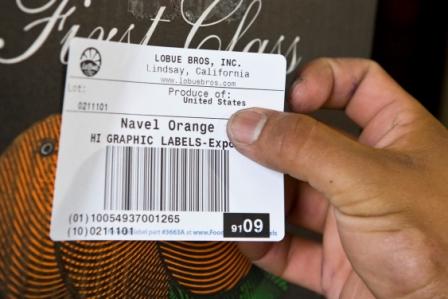LoBue Citrus is a family-run grower and distributor of oranges accounting for 4 to 5 percent of the California citrus industry. That equates to between 4 and 5 million boxes each year, with 40 percent of the product exported to Asia. Based in Lindsay, Calif., the company recognized the need to automate its produce traceability program. Formerly, the process was manual, which tied up critical resources and increased the likelihood of error.
FoodLogiQ, which provides software and solutions that meet the needs of the Produce Traceability Initiative, engaged LoBue Citrus with an automated system using Intermec (News ![]() - Alert) Smart Printing solutions."The key benefit for us is having a real-time, automated inventory control system, vs. the manual system we've had in place, and being able to make decisions both in sales and production on what we have available to us in real time," says Operations Manager Tom Clark (News - Alert).
- Alert) Smart Printing solutions."The key benefit for us is having a real-time, automated inventory control system, vs. the manual system we've had in place, and being able to make decisions both in sales and production on what we have available to us in real time," says Operations Manager Tom Clark (News - Alert).
Labeling Made Smarter
Most intriguing to Clark's team was the stand-alone nature of Intermec PM4i industrial smart printers. That meant it didn't require an additional computer to print labels, which minimized the cost of the solution. The system was also easy to use, which simplified and sped up worker adoption.
"We always look at simple as being the best solution," Clark says. "With the [Intermec] Smart Printers, all you need is a small area on a desk or a rolling cart to make this system functional. It seems to be a very cost-effective, simple solution to satisfying the requirements that are being requested of us today.
"Workers are able to scan a FoodLogiQ-generated barcode using an Intermec SR30 handheld scanner, which tells the Intermec PM4i industrial printer what label to print. The worker uses the PM4i printer's keypad to select a quantity on the display. Because the printer isn't tethered to a computer, workers can move the cart on which it is stationed directly to the boxes that require the tags. Once the boxes are wrapped, the workers use an Intermec PB50 mobile printer to generate a pallet tag (News - Alert). The box labels from the PM4i and pallet labels from the PB50 include a barcode that identifies the kind of orange, ship date, destination, farm source, and even the farm lot. This is a powerful tool should the company need to trace a shipment back to its origin.
"At any given moment, if we were to have a trace-back for some reason, it's simply a matter of getting notification from the consumer or buyer, and instantaneously, we can pull up all information associated to a certain lot," Clark says.
The Difference with Automation
The new system has made it possible for these trace backs to occur within a matter of minutes, whereas before the implementation it took roughly two hours. The inventory accuracy has improved as well. Every additional percentage point in accuracy helps a produce distributor stay competitive. Before the implementation, accuracy ranged from the high-80 to low-90 percent; accuracy is now between 98 and 99 percent. Because the system is automated, physical inventories have become a thing of the past, saving eight to 16 labor hours each day, which equates to approximately $96 to $240 saved in labor costs per day. Given the early improvements, Clark believes the system will pay for itself within two years, and all subsequent gains beyond that will further help the business.

Because FoodLogiQ presented an entire solution – incorporating its PTI solution with a full line-up of Intermec technology (a PM4i industrial printer, PB50 mobile printer, and SR30 handheld scanner) – LoBue Citrus was able to focus on its core business. "The whole process with FoodLogiQ was hands-on," Clark says. "We didn't have to go out and try to piece together our own system. FoodLogiQ has been able to integrate the whole package of requirements that we need beyond just the G10 code identification number. [It has] incorporated food-safety programs, and you can actually keep your food-safety documentation in [its] system."
A Single Hardware Manufacturer
LoBue Citrus processes up to 1,200 packages an hour, and the system has held strong. During the day, the Intermec hardware sits on a warehouse loading dock that is open to the outside. Even in conditions such as these, the equipment works.
LoBue Citrus decided to go with a single hardware manufacture to simplify the complexity of the system. The system operators needed to be able to work with a handheld scanner, industrial printer, mobile computer and mobile printer. Hence, having a commonality in the interface was essential to avoid a lengthy training period."
I find that once you find a system that you can rely on, it's much easier to have a single-source manufacturer, vs. trying to integrate pieces, especially pieces that have to communicate with one another," Clark says.Adds Clark: "What they've done is develop a system that is not commodity-specific. And in that, they've incorporated all the aspects of traceability, food safety, sustainability, pesticide application documentation, and record keeping. I've been involved in the production management of produce for 25 years, and this so far has been the easiest one I've been involved with."
Tim Eusterman is senior director of industry marketing at Intermec
Edited by Stefania Viscusi




